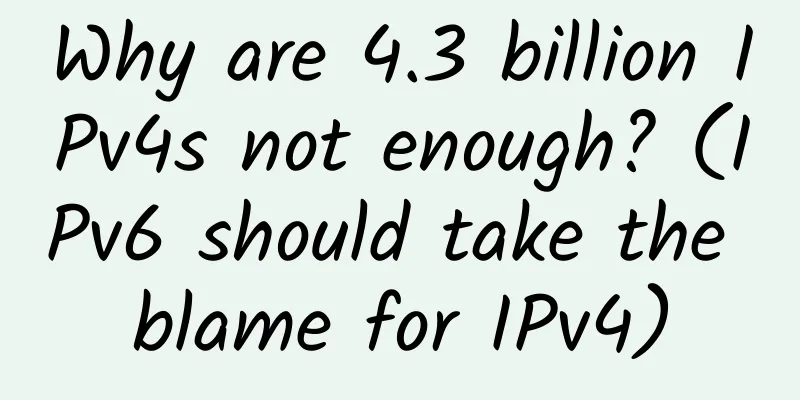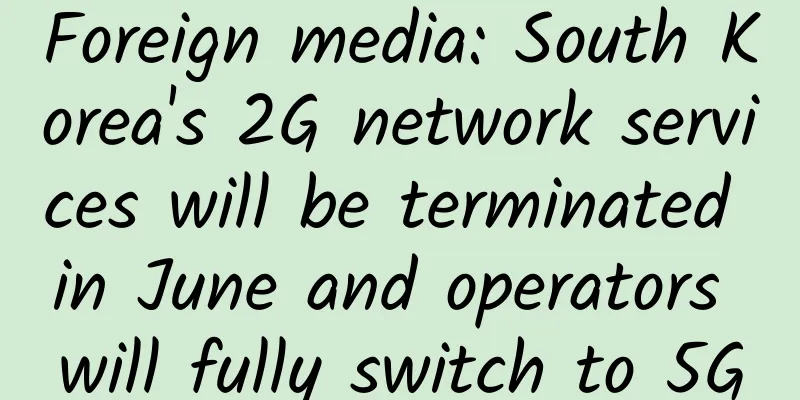Why are 4.3 billion IPv4s not enough? (IPv6 should take the blame for IPv4)

|
As we all know, the so-called IP address is a 32-bit address assigned to each host connected to the Internet. IPv4 stipulates that the length of IP address is 32 bits (divided according to the TCP/IP reference model), which is represented by a binary number, that is, there are 2^32-1 addresses, about 4.3 billion. According to data from the U.S. Census Bureau, the world's population exceeded 7 billion on March 12, 2012. This is definitely not enough. In the current network, IP addresses are divided into public IP addresses and private IP addresses. Public IP addresses are IP addresses used on the Internet, while private IP addresses are IP addresses used in local area networks. These intranet IPs can access the Internet using a technology called NAT, which greatly slows down the exhaustion of IPV4. Many individual users and home users do not actually occupy too many public IP addresses, and many small businesses use broadband without fixed IP addresses, which can also save IP resources. Although there are various means to maximize the use of IP resources, with the explosive growth of the Internet (for global users), IPv4 naturally cannot meet the growing demand for Internet services (although NAT technology is good, it is not enough to eat staple food, so snacks are used to supplement it. Snacks are just snacks and cannot replace staple food). In addition, IP addresses are not allocated based on the population of a region, which leads to an increasingly serious conflict in address demand over time (IPs are bound to become increasingly tight in areas with large populations). So IPv6 is here. IPV6 uses 128-bit IP addresses and the total number of IPs is 2^128, which is more than the total number of grains of sand on the earth, while the total number of IPV4 is 2^32. You may wonder why IPv6 has not come yet (much ado about nothing). In the process of TCP/IP development over the years, in order to provide corresponding services, the IETF Association has produced a large number of protocols and standards. Some protocols fully support IPv6, while some protocols need to be modified. However, the main resistance does not come from knowledge, but from the demanders (users) of these changes. The upgrade of IPv6 will inevitably eliminate some network infrastructure devices that do not support the IPv6 protocol, which will increase the cost of operators.
At the same time, many software developers have to redevelop based on IPv6. In this way, our current cheap network services will inevitably become expensive in a period of time, and operators will have to consider the economic problems that users will face when upgrading. Therefore, they will not easily upgrade before NAT has exhausted all ports. For operators, it is completely no problem for core equipment to support forwarding IPv6. Perhaps people have not yet reached the point of burning their butts, and change will never be achieved overnight. Replenish: The NAT mechanism allows multiple computers in a site to use the Internet through a single IP address. NAT: Differentiate between inside and outside. To avoid address conflicts, NAT assigns a unique local address to each computer. When exchanging information with the outside world, the local private address is converted into a global IP address that can be recognized on the entire Internet. |
<<: 10 common mistakes in integrated wiring, see how many you have made
>>: Gathering Wisdom and Energy | Huawei Network Energy China Tour Beijing Station Grandly Held
Recommend
Facebook Open/R, the next generation routing platform and the future of network engineering
[[213724]]...
20% off for edgeNAT, 1G memory package in Korea/Hong Kong/US data center starts from 48 yuan per month
edgeNAT is a Chinese VPS hosting company, founded...
I heard that the client will disappear within three years.
[[400044]] This article is reprinted from the WeC...
Can 5G enable remote surgery?
In the early days of 5G, we often saw various hig...
CloudCone Black Friday promotion, KVM annual payment starts from $14.2, supports Alipay, Los Angeles data center
CloudCone has once again released this year's...
What are the challenges of using multiple team collaboration apps?
Many companies are already using various team col...
CMIVPS: $863.5/year-E5-2620*2, 32G memory, 480G SSD, 30M bandwidth, Hong Kong server promotion
CMIVPS yesterday launched a 50% discount on the a...
RAKsmart cluster server starts from $177.52/month, 5+253 IPs, San Jose/Los Angeles/Japan/Hong Kong data centers available
We have shared information about RAKsmart cloud s...
The preliminary round of the 10th "H3C Cup" National College Students Digital Technology Competition 2020 was successfully concluded
[51CTO.com original article] On November 14, 2020...
How to deploy multiple computer rooms? How to synchronize data?
Author: Guo Guanhua, unit: China Mobile Smart Hom...
The key to managing "big data killing old customers" is to prescribe the right medicine
[[343477]] To manage the phenomenon of "big ...
How DevOps is shaping the future of networking
Since its advent in 2009, the DevOps philosophy h...
The three major operators simultaneously announced the new layout of Wi-Fi 6 and entered the "three-gigabit era" in 2020
Recently, the three major operators have made cor...
Ruizhi Big Data: Injecting Intelligent Genes into Dual-State IT
In the summer of 2019, a set of data about China&...
Is it really possible for humans to achieve immortality on the Internet?
Through the connection of virtual network devices...









